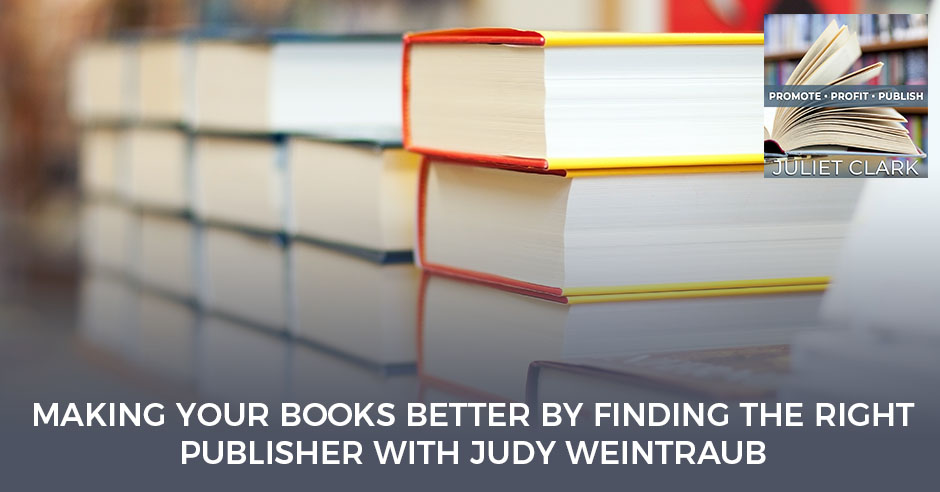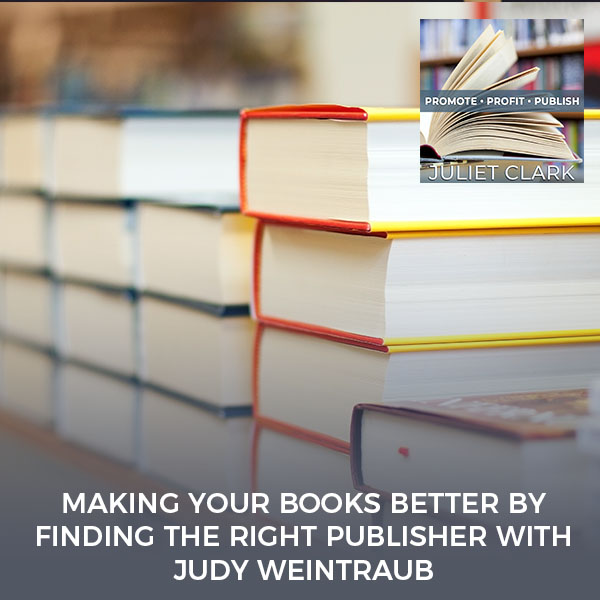
Multiple things go behind the scenes when publishing a book. There’s writing, editing, proofreading, and platform-building. It may be too much for one person, and that’s why you may need a publisher to help make your books better. Juliet Clark’s guest today is Judy Weintraub, the Founder of SkillBites, a book-publishing platform that helps entrepreneurs and professionals quickly finish their books. Judy explains that although you may not build a stable passive income stream from selling your books, it can increase your visibility when growing your business. Tune in and learn more about book publishing!
—
Watch the episode here
Listen to the podcast here
Making Your Books Better By Finding The Right Publisher With Judy Weintraub
Before we get started, I want to remind you to subscribe to us on Super Brand Publishing. Also, don’t forget to go over and take the Promote Profit Publish Quiz at www.PromoteProfitPublishQuiz.com. Find out if you’re ready to publish. Publishing is not just writing a good book. It’s also building an audience, publishing that book and then having a solid plan for promotion. Our guest is Judy Weintraub. She is an accomplished entrepreneur, business executive, attorney, and a best-selling author of The Essentials of Negotiating Effectively, and also the author of How to Build Successful Business Partnerships. She is the Founder of SkillBites, a book-publishing platform designed specifically for entrepreneurs and professionals to get their books done quickly so they can gain credibility and visibility to grow their businesses. In addition to SkillBites, Judy runs Weintraub Legal Services providing Corporate Law services to small businesses and dispute resolution services. Welcome, Judy.
Thank you, Shirley. How are you doing?
I’m great. How are you?

Books Better: If you want your book to build up your credibility and enhance your visibility, it better be a good book.
Wonderful, thanks.
For all you guys, you’re probably thinking like, “Juliet, you run a publishing company. Why would you have Judy on?” The reason is, is even though she is in some ways a competitor, I want you to hear from my competitors over and over that you need to have a platform built. This is not just something I made up to sell publishing packages. It’s something you need. Judy, when you talk to your clients, what do you tell them about the why and platform building?
Most of my clients are looking to self publish. They need to have a platform because when their book comes out, they’re going to need to let people know that their book is out and their platform is a great way to develop that network of people to promote their book too. They’re not necessarily looking to get any return on investment from the sale of the book. In fact, most of them are giving the book away, but if they want to increase their number of prospects and clients, generate leads or have other business objectives, then they’re going to need that platform so that they can use their book to help them achieve those objectives.
It’s interesting you said that because when I talk to my clients, I tell them right up front, “You’re not going to get ROI in the form of the book,” which you and I can talk about. Usually, it is somewhat of a loss leader and you’re using it for those higher ticket items. Would you agree with that?
Definitely, that’s what I tell my clients as well, that if they’re looking for the passive income stream, it’s not there. They might get a little bit, but they can get far more value from their book by giving it away than they can by selling it.
If your book isn't well-written, it can detract from your credibility. Share on XYou’re not going to have the island next to Richard Branson’s from book sales. It’s not likely to happen on that. How far out should people start building that platform?
Ideally, they would start building it before they even start their book, but at a minimum at the early stages of writing their book and the platform can be used, not just for when the book comes out, it can be used pretty nicely while you’re writing the book. You can raise questions like, “Which topic would be of more interest to you or which cover do you like better? Tell me what your biggest challenges are so I can address them in my book.” You’re getting the word out about your book, you’re building engagement, and sometimes you get some helpful information as well.
I think one of the big downfalls in this entrepreneurial industry is people write the books for the wrong reasons. They go off to this business rah-rahs, and they share with the guru in the room that their products and services start aren’t selling the way they’d like and the answers, the book. Without that platform, the book is another failed product.
It can be. You can still have some benefits from a book, even if you don’t have that platform, but your book will be a lot more effective for you. If you do have a decent platform
That the advantage of building that platform is you have feedback in advance so you know you’re writing the book that your audience needs. That feedback is r helpful too, as you’re going along, because you’re on the right track. “This is the book people are looking for.”
It can be confusing also though when you get conflicting feedback from people.
You help people with writing the book, which is something that I don’t do. Why is it important to have that book well-written and, put together in a meaningful way that will help people?
There are many answers for that, Juliet. The first is that most people of my clientele anyway, are looking for the book to enhance their credibility. If the book isn’t well-written, it can detract from your credibility. I remember one book that a colleague of mine sent me and asked me if I would review it and give her a testimonial. I got less than 60 pages into her book. I absolutely couldn’t finish it because she had so many errors in the book. I ultimately did give her a testimonial based on, the fact that there was a tip at the beginning that I thought was valuable, but I came away thinking less of her as a result of looking at her book. That’s not what you want. If your book is to build up your credibility and enhance your visibility and all these things, then it better be a good book. It’s why it’s so important to have your book edited.
One of the things that I find is when we run bestseller campaigns, the books that we get that have engaged a writing coach are so much more successful than those who haven’t. They’re direct, they’re on point, and they tend to be more well-written because of the structure of them. That’s what you help people do, right?
I do. Book coaching, I also have ghostwriting services for people who realize that they’re not the best person to write this book, whether it’s because they’re not a writer or because they’re busy with other things. If writing’s not their primary skill, have a professional, write it and it’ll get done a lot faster and a better quality book.
That is so true and know your skillset. I’ve written 7 or 8 books mine are so heavily edited because I’m a good storyteller and not a good writer. That’s important to know your skillset, number one, and number two, to have the editor in place to look at it and tell you, “Does this need work? Does this need revisions?” We just recently had an author who didn’t take any of the editors’ comments. First review right out of the gate, was the critique of that particular piece that she didn’t correct, that she didn’t heed.
Is it worth your time? You may be spending far more time working on your book than a ghostwriter would and that could be time that you’re building your business instead, which is your core competency.
Staying in your zone of genius and letting the others around you stay in theirs. With a ghostwriter, you speak a lot of that book. If you’re an expert, it’s easy to jump on with a ghostwriter and talk about it and then have the ghostwriter take that and write the copy and the text on it.

Books Better: From the author’s perspective, it’s critical to own the copyright to your book. From the publisher’s standpoint, make sure there’s nothing defamatory, libelous, or improper in the book or they haven’t plagiarized anybody else.
That’s my ghostwriters work is they create interview questions, record the interviews so that they can get the author’s voice and tone in the book and do it in stages. They’ll do the first chapter, get some feedback so that they know for the next chapter, what the author wants, the tone and voice to be, and then proceed that way.
That’s a great way to do that. You’re getting ready. When is the point that you should start looking for a publisher? People typically, don’t build the platform, they write the book and then they start this whole process.
It varies if you can get started on the book yourself and get it pretty far along, you could start looking for the publisher when you are maybe somewhere in the range of 70% done with the book so that everything is lined up for when the book is fully done. If you need help with the writings of the book, the outlining, deciding on your topic or things like that, then it makes more sense to be starting to look for that publisher or a book coach early in the process.
It’s because Judy’s a lawyer, I’m going to throw something else in here. When you are talking to publishers and negotiating that contract, I always feel like it’s very important to have somebody with integrity look it over. If I have an engineer speaking to me and they’re speaking engineering speak, what they’re saying is going to sound good, but it might not be what I think it is. There’s a lot of that that goes on in the publishing world where we have a language we speak and when we sell these packages, they sound good but what the authors hearing may not be what we’re talking about. Would you agree with that? I think people should.
There can be a disconnect. There are certain things that authors should be cognizant of when contracting with a publisher and then there are other things that publishers should be protecting themselves against. For instance from the author’s perspective, it’s critical. You want to own the copyright to your book. If your publisher has a clause in it that you’re giving up the copyright, either you have to get enough money to make that worthwhile, or you have to negotiate that out of your contract or go find another publisher. From the publisher’s standpoint, you want to make sure that there’s nothing defamatory, libelous or improper in the book they haven’t plagiarized anybody else. You need to have some protection in that respect. There are different legal protections that both parties need to look at. Those are one example for each of them, but there’s a bunch of others as well.
I love that we have a book coming out in March. It’s health and wellness and, they’re coming in from a different perspective. I’ll give you some examples here. Some stuff I’ve seen, Judy mentioned your copyright somebody brought me a contract. They wanted me to republish their book and it said that they own the copyright, but it limited them. They couldn’t move their book from that particular publisher within five years. It was self-publishing, she signed the contract and she did not acknowledge it. She didn’t understand that she owned the copyright, but she couldn’t move the book.
If writing is not your primary skill, have a professional write your book. It will get done a lot faster and will be a better quality book. Share on XSomething else I’ve seen, where it’s very cheap to publish, but you’re committing yourself to giving the publisher 30% of your online sales from your programs and services. When that person brought me the contract, I said, “How much did you make last year from your programs and services?” She said, “$240,000.” Think about that for a minute when you’re signing the contract. It was only $1,000 to publish, but she was committing to giving approximately $80,000 of her business profits, which is like no one should pay that much for a book. It’s important. Judy is going to back me up on this that you should have a professional look over that contract and tell you, “Yey, nay, absolutely not, rip this up, burn it,” whatever with the contract.
It depends on the contract. I pride myself on having a fairly straightforward plain English contract because I want my authors to understand what I’m offering and what they’re contracting for, but I’ve seen some complicated ones out there.
Mine is very straightforward as well. We don’t keep any of the backend profits. They can take what they have at any time, but I’ve seen some stuff that blows my mind and thank God people read it themselves and said, “Does this sound right to you?” Judy, this has been a great discussion. Where do we find you if we, if we want to find out more about your publishing services, what you’re up to, your writing services?
My website is a good resource. It’s SkillBites.net and email, Judy@SkillBites.net. That works too.
Thank you for your time. This has been a wonderful discussion and I’m sure my audience got a lot out of it.
Thank you for having me, Juliet.
Important Links
- www.PromoteProfitPublishQuiz.com
- The Essentials of Negotiating Effectively
- How to Build Successful Business Partnerships
- SkillBites
- Weintraub Legal Services
- Judy@SkillBites.net
About Judy Weintraub
 Judy Weintraub is an accomplished entrepreneur, business executive and attorney and is a bestselling author of The Essentials of Negotiating Effectively and the author of How to Build Successful Business Partnerships. She is the founder of SkillBites, a book publishing platform designed specifically for entrepreneurs and professionals to get their books done quickly so they gain the credibility and visibility to grown their business. In addition to SkillBites, Judy runs Weintraub Legal Services, providing corporate law services to small businesses, and dispute resolution services.
Judy Weintraub is an accomplished entrepreneur, business executive and attorney and is a bestselling author of The Essentials of Negotiating Effectively and the author of How to Build Successful Business Partnerships. She is the founder of SkillBites, a book publishing platform designed specifically for entrepreneurs and professionals to get their books done quickly so they gain the credibility and visibility to grown their business. In addition to SkillBites, Judy runs Weintraub Legal Services, providing corporate law services to small businesses, and dispute resolution services.
Love the show? Subscribe, rate, review, and share!









Leave A Comment